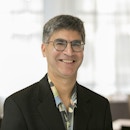Learning to Count in String Theory
- Speaker
-
 Shamit Kachru, Ph.D.Professor of Physics and Director, Stanford Institute for Theoretical Physics, Stanford University
Shamit Kachru, Ph.D.Professor of Physics and Director, Stanford Institute for Theoretical Physics, Stanford University
Presidential Lectures are free public colloquia centered on four main themes: Biology, Physics, Mathematics and Computer Science, and Neuroscience and Autism Science. These curated, high-level scientific talks feature leading scientists and mathematicians and are intended to foster discourse and drive discovery among the broader NYC-area research community. We invite those interested in the topic to join us for this weekly lecture series.
By clicking to watch this video, you agree to our privacy policy.
String theory has enjoyed tremendously fruitful interactions with modern mathematics. Some of the simplest and most interesting questions in number theory and geometry involve counting (for instance, determining numbers of integer solutions to certain equations).
In this talk, Shamit Kachru will discuss how in the process of answering natural physical questions — such as about strong coupling dynamics in quantum field theories, black hole physics and solutions of Einstein’s equations — string theory uses (and sometimes solves) those counting problems. The talk will begin with a general discussion of string compactifications with supersymmetry, and the special role played by Calabi-Yau manifolds. Mirror symmetry will appear as a first example where striking applications to geometry occur. The use of string techniques to solve strongly coupled supersymmetric non-Abelian gauge theories will be a natural sequel, and Kachru will close with recent work relating this circle of ideas to the long-standing problem of determining a Ricci-flat metric on a compact Calabi-Yau manifold.
